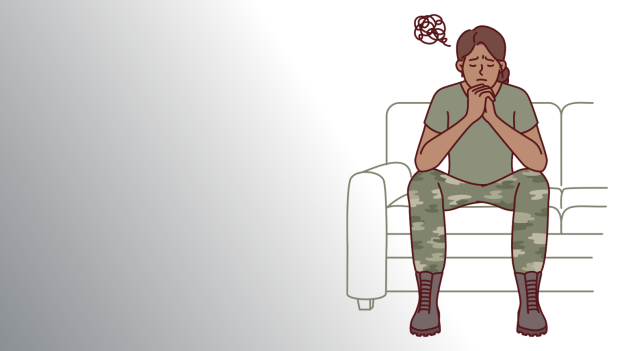Let’s talk about Post-traumatic Stress Disorder (PTSD)
Over 12 million American adults are affected by post-traumatic stress disorder in any given year. Post-traumatic stress disorder is an anxiety disorder that one develops after living or witnessing an event (i.e., war or combat, natural disasters, violent crimes, car accidents) that caused or threatened serious harm or death.
People with PTSD can have recurring nightmares, flashbacks, become irritable, and withdraw from others, leading to significant life impairment. Thankfully, there are several different treatment options making recovery possible.
Symptoms
Symptoms of PTSD fall into four different categories: intrusions, avoidance, alterations in cognition and mood, and alterations in arousal and reactivity. The symptoms associated with each category are listed below (American Psychiatric Association, 2022):
Intrusions
Intrusive thoughts, involuntary memories, nightmares
Flashbacks, reliving the traumatic event and feeling like it is actually happening again
Avoidance
Avoiding anything (i.e., people, places, situations, etc.) that may trigger distressing memories
Alterations in cognition or mood
Negative thoughts or feelings about oneself or others (i.e., “I am bad” or “The world is an evil place”)
Distorted thoughts about the event (i.e., what led to it, what the consequences were, etc.)
Constant feelings of fear, guilt, shame, anger, or horror
Less interested in activities they once enjoyed
Feeling detached from others
Alterations in arousal and reactivity
Irritable
Angry outbursts
Behaving reckless or self destructive
On alert of one’s surroundings
Easily started
Problems concentrating
Problems sleeping
If you or someone you know is experiencing symptoms, check your risk by taking our PTSD screening.
Treatment
Treatment will vary depending on the severity of the disorder, but most treatments include psychotherapy, medication, or a combination of the two.
It is important to know that treatment for mental health conditions are tailored to the individual and the information presented here are just a few of the many different treatment options.
Psychotherapy
Psychotherapy is a form of treatment conducted by a trained and licensed therapist (i.e., psychologist, social worker, or counselor). The therapist provides a supportive environment for individuals to talk openly about their mental health condition(s) and emotional challenges with someone who is objective and non judgmental. There are many different types of psychotherapy, but in general the therapist and patient work together to identify the causes of their mental health condition, develop coping mechanisms, and challenge thinking and behavioral patterns.
Cognitive Behavioral Therapy
One of the most effective forms of psychotherapy is cognitive behavioral therapy (CBT). This type of psychotherapy is based on the principles that mental health conditions derive from unhelpful ways of thinking and learned patterns of unhelpful behavior. Symptom relief occurs by individuals challenging and changing their thinking and behavioral patterns (American Psychological Association, 2017).
Exposure Therapy
In this form of psychotherapy, therapists safely and gradually expose patients to situations and memories that they find frightening. This helps the patient learn effective ways to cope when they feel triggered or afraid (Mayo Clinic, 2022).
Eye Movement Desensitization and Reprocessing (EMDR)
Eye Movement and Reprocessing (EMDR) therapy has patients focus on a traumatic memory while experiencing bilateral stimulation (eye movements) and aims to change the way the memory is stored in the brain. This form of therapy aims to reduce the emotions associated with the traumatic memory (American Psychological Association, 2017).
Medications
Medications can help relieve PTSD symptoms. Antidepressants and anti-anxiety medications are typically prescribed. Anti-anxiety medications help calm people down and prevent them from reacting in a fearful way (Mental Health America, 2023). It is not uncommon for medications to take several weeks or longer to work and you may need to adjust or dose your type of medication multiple times before finding what works best for you and your symptoms (Mayo Clinic, 2019).
It is important to consult with a medical provider before taking any medications.

Resources
Looking for information, tools or resources for mental health?
Visit our online resource library, where you’ll find tools and apps to support your mental health and wellness, information about mental health and common mental health conditions, on-demand videos and trainings, interactive tools to help you build wellness and safety plans, research and reports, resources for schools and workplaces, and much more!

